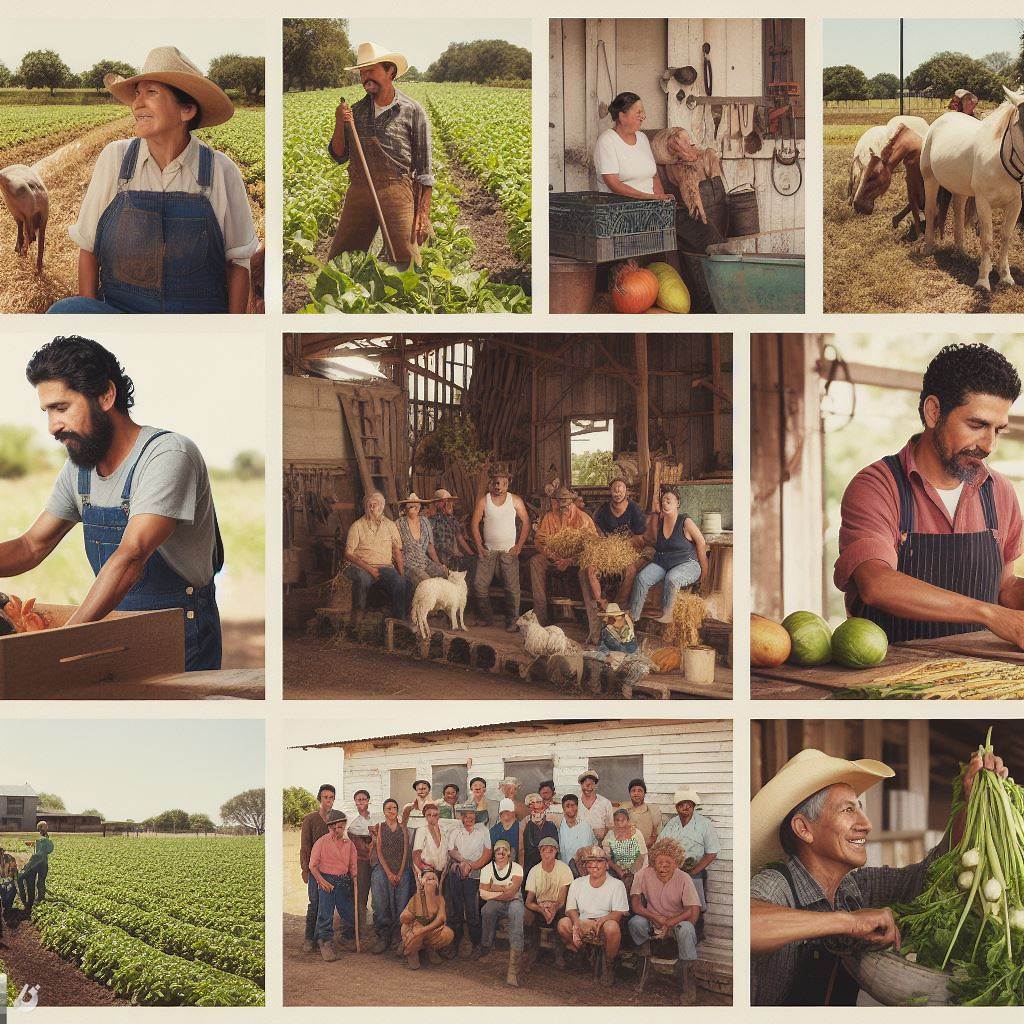Farmers’ Stories: Voices Behind Your Food
Last Updated on March 2, 2024
Introduction
Farmers play a vital role in the food industry, ensuring our plates are filled with nutritious and delicious produce.
They work tirelessly to bring us fresh fruits, vegetables, grains, and meat.
Without farmers, our grocery stores would be empty, and our diets would be lacking in essential nutrients.
They are the backbone of the food industry, dedicating their lives to cultivating and harvesting crops and raising livestock.
In this blog section, we bring you “Farmers’ Stories: Voices Behind Your Food,” where we aim to shed light on the incredible and often untold stories of farmers.
We believe it’s important to hear directly from these hardworking individuals who provide us with sustenance.
Through this post, we will share personal accounts, triumphs, and challenges faced by farmers, allowing their voices to resonate with readers.
By doing so, we hope to create a deeper understanding and appreciation for the farmers’ dedication and passion for their craft.
By narrating their experiences, we hope to humanize their role in the food industry, moving beyond the stereotypical image of a farmer to reveal the complex and diverse individuals behind the scenes.
Through these captivating stories, we aim to connect consumers to the people who grow their food, fostering a sense of gratitude and acknowledgment for the immense effort that goes into every meal.
Join us as we embark on this journey into the lives of farmers, celebrating their contributions and gaining a fresh perspective on the food we consume.
The Life of a Farmer
Farming is a way of life, filled with challenges, hard work, and dedication.
Farmers play a crucial role in feeding the world, but their stories often go untold.
From dawn till dusk, farmers are out in the fields, braving the elements and tending to their crops and livestock.
They face numerous challenges that can make or break their livelihoods.
Challenges Faced by Farmers
Weather conditions often pose a significant threat to farmers.
Droughts, floods, storms, and extreme temperatures can devastate crops and wipe out entire harvests.
Market fluctuations add another layer of uncertainty.
Farmers have limited control over the prices of their produce, and fluctuations can affect their income and profitability.
Pests, both big and small, can wreak havoc on farms. Insects, rodents, and diseases can destroy crops and require farmers to invest in pest control measures to protect their yields.
Hard Work and Dedication
Successful farming requires relentless hard work and dedication.
Farmers must wake up early, work long hours, and often sacrifice personal time and vacations.
They plow fields, plant seeds, water crops, harvest produce, tend to animals, and perform various maintenance tasks to ensure a bountiful harvest.
Farmers must also stay updated on the latest agricultural practices, technologies, and market trends.
Continuous learning and adaptation are essential to stay competitive and successful.
Passion for the Land and Sustainable Practices
One common thread among farmers is their passion for the land.
Many come from generations of farmers, deeply rooted in their connection to the soil.
They view their land as more than just a means of income.
It’s their heritage, their legacy, and their responsibility to care for it and pass it on to future generations.
Farmers are increasingly embracing sustainable practices to protect the environment and ensure the long-term productivity of their land.
The life of a farmer is filled with challenges, hard work, and dedication.
They face unpredictable weather, market fluctuations, and pests, yet they persevere to feed the world.
Their passion for the land and sustainable practices drive them to work tirelessly, ensuring the continued productivity of their farms.
Next time you enjoy a meal, remember the farmers who put their heart and soul into producing the food on your plate.
Their stories deserve to be told and celebrated.
Farmers’ connection to the food they grow
Farmers have a deep connection to the food they grow.
They view it as more than just a job; it is their passion and livelihood.
Their role in nourishing the population
They understand the importance of their role in nourishing the population and take great pride in it.
Personal stories of farmers who take pride in their produce
One such farmer is Sarah, who owns a small family farm in the countryside.
She grows a variety of organic fruits and vegetables, believing in the importance of providing healthy and nutritious food to her community.
Sarah wakes up before dawn every day, tending to her crops with love and care.
She knows that her hard work will directly impact the lives of many people who rely on her produce.
Like Sarah, her stories showed how many farmers consider themselves stewards of the land, working in harmony with nature.
They understand that the food they produce not only sustains individuals but also supports local businesses and the economy.
They take responsibility for feeding their community and strive to do so in the most sustainable way possible.
The satisfaction of seeing their food on consumers’ plates
In addition to their vital role in nourishing the population, farmers also take great satisfaction in seeing their food on consumers’ plates.
For them, it is a validation of their hard work and dedication. It brings them joy to know that their produce is being enjoyed and appreciated by others.
The smiles on people’s faces when they taste the delicious flavors of their crops make all the hours of labor worthwhile.
Every harvest season, farmers like Sarah eagerly await the feedback from their customers.
They take pride in providing fresh, high-quality produce and hearing positive reviews from those who consume it.
It reassures them that they are making a difference and motivates them to continue their farming journey.
To further connect with their customers, some farmers have started organizing farm-to-table events.
These events allow consumers to visit the farms, witness the farming process, and even help with harvesting.
It provides an opportunity for people to see firsthand the hard work and passion that goes into growing their food.
This connection between farmers and consumers fosters a sense of community and strengthens the appreciation for locally sourced produce.
Farmers also recognize the responsibility they have in educating the public about the importance of sustainable farming practices.
They want to ensure that future generations understand the value of agriculture and the need to protect the environment.
Many farmers actively engage in teaching programs, where they share their knowledge and experiences with students and aspiring farmers.
In essence, farmers have a deep connection to the food they grow, recognizing their crucial role in nourishing the population.
They take great pride in their produce and find satisfaction in seeing it on consumers’ plates.
Farming is more than just a job for them; it is a way of life filled with passion and dedication.
Through their hard work, farmers provide us with the nourishment we need and contribute to the overall well-being of society.
Read: Precision Agriculture: Tech in Crop Cultivation
The farmers behind different types of food
Dairy farmers’ commitment to quality milk
Dairy farmers put their hearts into producing quality milk for consumers every day.
Their dedication stems from a deep-rooted passion for their cows and the happiness they bring to people’s lives.
These farmers start their day before the crack of dawn, ensuring that their cows are well-fed and comfortable.
They meticulously clean the barns, maintaining a sanitary environment to keep their cows healthy and produce safe milk.
Their commitment to providing high-quality milk goes beyond the daily routine.
Dairy farmers constantly monitor the health of their cows, promptly addressing any signs of illness.
They work closely with veterinarians to maintain optimal herd health and prevent the spread of diseases.
Grain farmers and the importance of staple crops
Grain farmers play a crucial role in feeding the world’s population.
Their dedication to growing staple crops like wheat, rice, and corn ensures that people have access to essential food sources.
These farmers meticulously plan their planting schedules, considering weather patterns and soil conditions.
They invest in modern farming equipment and technology to improve crop yields and make efficient use of their land.
Throughout the growing season, grain farmers closely monitor their crops, combatting pests and diseases to protect their yield.
They employ sustainable practices, such as crop rotation and soil conservation, to maintain the long-term health of their fields.
Organic farmers and their dedication to sustainable practices
Organic farmers are the guardians of sustainable agriculture, committed to minimizing their environmental impact while producing healthy, natural foods.
They work in harmony with nature, embracing practices that maintain soil fertility and biodiversity.
These farmers reject the use of synthetic pesticides and fertilizers, relying instead on natural methods to manage pests and enrich the soil.
They practice crop rotation and cover cropping, harnessing the power of nature to maintain fertile land for future generations.
Organic farmers also prioritize animal welfare, providing their livestock with access to outdoor space and a natural diet.
They steer clear of genetically modified organisms and focus on preserving the purity of their crops.
Fruit and vegetable farmers and the role of freshness and flavor
Fruit and vegetable farmers take pride in growing produce that bursts with freshness and flavor.
Their commitment to cultivating delicious, nutritious crops adds vibrancy to our plates and nourishment to our bodies.
These farmers carefully select the best varieties of fruits and vegetables, considering taste, texture, and nutritional value.
They pay attention to every detail, from the timing of harvest to the gentle handling of their delicate crops.
Farmers in this sector recognize the impact of climate and soil on the flavor of their produce.
They optimize growing conditions, providing adequate water, sunlight, and nutrients to enhance the taste and quality of their fruits and vegetables.
In general, behind every type of food we enjoy, there are dedicated farmers who pour their hearts and souls into providing us with quality products.
Whether it’s dairy, grains, organic produce, or fresh fruits and vegetables, these farmers are the backbone of our food system.
Their commitment to their craft is evident in every bite we take.
Let’s appreciate and support these hardworking individuals who make our meals possible.
Read: Local Foods Impact: A Consumer’s Guide

Challenges and Misconceptions Faced by Farmers
Farmers are often portrayed as romantic figures in society, tending to their crops and livestock in idyllic rural settings.
However, the reality is far from this romanticized image.
Farmers face numerous challenges and misconceptions that impact their lives and livelihoods.
The public perception of farmers and the reality they face
One of the most significant challenges farmers encounter is the public’s perception of their profession.
Many people view farmers as quaint and outdated, failing to recognize the critical role they play in feeding the world.
The reality is that farmers are essential for food production, constantly adapting to new technologies and scientific advancements.
Economic struggles and financial risks involved in farming
Additionally, farmers face economic struggles and financial risks that can be overwhelming.
Farming is a high-risk industry, with unpredictable weather patterns and market fluctuations that can have a significant impact on their incomes.
Farmers have to deal with rising costs of inputs such as seeds, fertilizers, and machinery, while also ensuring competitive prices for their produce.
Addressing common misconceptions and stereotypes
Addressing common misconceptions and stereotypes is crucial in understanding the challenges faced by farmers.
One misconception is that farming is an easy and simple job, with farmers merely planting and harvesting crops.
In reality, farmers have to be skilled in various areas such as agronomy, animal husbandry, machinery maintenance, and business management.
Another misconception is that all farmers are wealthy landowners.
While some farmers may own large tracts of land, many operate on small-scale or leased land.
These farmers often face additional challenges, such as limited access to credit and resources, making it harder for them to invest in modern farming practices.
To combat these misconceptions, it is essential to highlight the diverse nature of farming.
Farmers come from various backgrounds, ranging from multi-generational farm families to young entrepreneurs who have entered the industry with innovative approaches.
By showcasing these diverse stories, we can challenge the stereotypes associated with farming.
Furthermore, supporting policies and initiatives that help farmers cope with economic challenges is crucial.
Governments and organizations must provide financial assistance, access to markets, and technical support to ensure the sustainability of farming operations.
Society as a whole must also value and appreciate the efforts of farmers, recognizing their contributions to the food system.
In a nutshell, farmers face a range of challenges and misconceptions that impact their lives and their ability to feed the world.
It is essential to shift public perceptions and address the realities faced by farmers, including the economic struggles and risks involved in farming.
By doing so, we can ensure the continued success and sustainability of the agricultural industry.
Read: Organic Trends in Farm-to-Table Dining
Inspiring stories of farmers overcoming adversity
In the world of farming, challenges are inevitable.
However, there are countless farmers who have demonstrated remarkable resilience and perseverance in the face of adversity.
Their stories of farmers serve as powerful reminders of the human spirit’s ability to adapt, innovate, and overcome.
Examples of farmers who adapted to changing conditions
One such example is the story of John, a farmer who took bold measures to adapt to changing conditions.
Faced with frequent droughts in his region, John decided to implement sustainable farming practices.
He installed a state-of-the-art irrigation system that maximized water efficiency, allowing him to continue cultivating his crops despite the arid climate.
By adapting to the changing conditions, John not only ensured the survival of his farm but also became a role model for other farmers facing similar challenges.
Another inspiring tale comes from Sarah, a young farmer who embodies perseverance.
Sarah’s family had been in the farming business for generations, but when a devastating tornado struck their land, everything seemed lost.
Determined not to let adversity define her, Sarah worked tirelessly to rebuild the farm from scratch.
She garnered support from her community, and together they erected new structures and replanted the fields.
Sarah’s unwavering determination and resilience became an inspiration to her fellow farmers, proving that setbacks may be temporary, but a strong spirit can prevail.
Highlighting farmers’ ability to find innovative solutions
Highlighting the ability of farmers to find innovative solutions is the story of Carlos, an organic farmer.
When faced with a dwindling customer base due to increasing demand for conventional produce, Carlos decided to diversify his offerings.
He introduced unique varieties of fruits and vegetables that were not commonly found in the market.
Through clever marketing and education campaigns, Carlos generated considerable interest in his distinct produce and managed to carve out a niche market for himself.
His ability to think outside the box and adapt to changing consumer preferences allowed him to thrive despite the challenges.
Stories of perseverance and resilience in the face of challenges
These stories of farmers overcoming adversity showcase the incredible strength and resourcefulness present within the agricultural community.
Farmers are not just individuals tending to the land; they are problem solvers, innovators, and leaders in their own right.
Their ability to adapt to changing conditions, their perseverance in the face of challenges, and their knack for finding innovative solutions are what make them so inspiring.
Furthermore, farmers stories serve as a reminder to consumers about the incredible journey their food undertakes before reaching their plates.
Behind every apple or bag of potatoes lies a farmer who has weathered storms, literal and metaphorical, to bring that food to the table.
By sharing and celebrating these stories, we can deepen our appreciation for the farmers who provide us with sustenance and gain a greater understanding of the complexities and triumphs of the agricultural world.
In summary, the stories of farmers overcoming adversity are a testament to the human spirit’s ability to adapt, innovate, and persevere.
Through their determination and resilience, farmers like John, Sarah, and Carlos have not only survived but thrived in the face of challenges.
Their stories inspire us to appreciate the hard work and ingenuity that goes into producing the food we consume.
Let us continue to support and celebrate the farmers behind our food, for their stories are the embodiment of resilience and hope in the agricultural world.
Read: Farm-to-Table 101: Basics of Farm-Fresh Eating
Gain More Insights: Community Supported Agriculture (CSA) Guide
Conclusion
Farmers play a vital role in the food industry, providing us with the sustenance we need to survive.
Their hard work and dedication should be appreciated and supported.
Farmers are the backbone of our food industry.
They grow the crops and raise the livestock that end up on our plates.
Without them, our food supply would be severely impacted.
Supporting local farmers not only helps sustain their livelihoods but also allows us to enjoy fresh, nutritious, and locally sourced food.
Take the time to learn about and appreciate the hard work that goes into farming.
We want to hear your stories! Share your experiences with farmers, whether it’s a fond memory of a visit to a local farm or simply the appreciation you have for their work.
Engage with us and let’s celebrate the stories behind our food.


